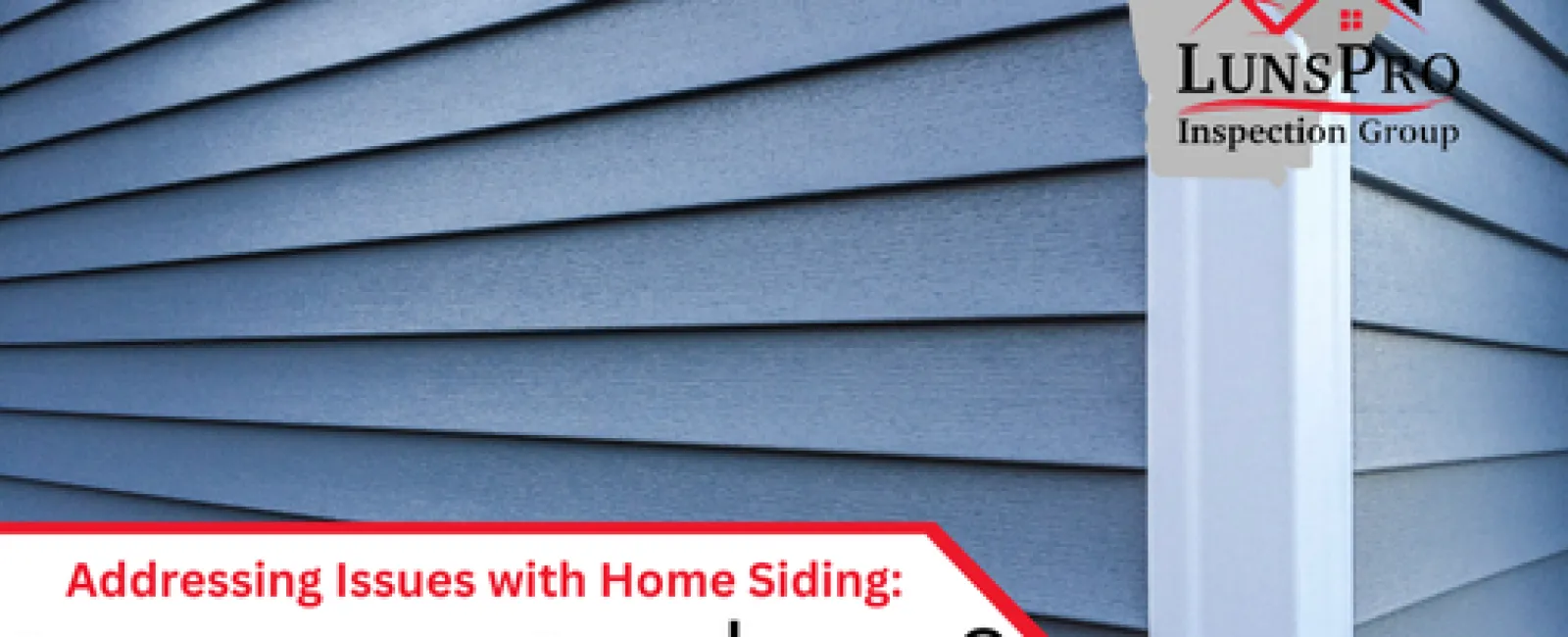Maintaining the integrity of your home's siding is crucial for protecting your property from the elements and maintaining curb appeal. Whether you're a new homeowner or have been living in your house for years, the condition of your siding is something that demands regular attention. Damaged or deteriorating siding can lead to serious problems, such as water infiltration, structural damage, and even mold growth.
As a trusted provider of comprehensive home inspection services, LunsPro Inspection Group understands the importance of addressing issues with home siding. This blog will provide an in-depth look at when to repair or replace your siding, along with essential insights into how professional inspections can safeguard your investment. Whether you reside in Charlotte, NC, or anywhere in the Carolinas, it's important to be informed about your options and the potential risks of neglecting your siding.
Understanding Siding Problems
Siding acts as your home's first line of defense against weather, pests, and physical damage. Over time, wear and tear are inevitable. Some common signs of siding issues include:
- Cracks and Holes: Small cracks may not seem like a big deal, but they can allow water to seep in, leading to more significant problems. If the damage is localized, it may be possible to repair the affected area.
- Warping and Buckling: Warped or buckled siding is often an indication of underlying moisture problems. This can compromise the structural integrity of your home and may require more than just surface repairs.
- Fading and Discoloration: While faded siding might only affect your home's appearance, discoloration can indicate problems like water damage or mold growth. Carolina mold and air quality testing can determine if mold is present behind your siding.
- Rotting or Peeling: Wood siding is especially vulnerable to rot if not properly maintained. Peeling paint or rotting wood requires prompt attention, as it can quickly spread and damage more extensive areas.
- Increased Energy Bills: If you've noticed a spike in your energy costs, your siding may no longer be insulating your home as effectively as it should. Poor insulation can result from old, damaged, or improperly installed siding.
When to Repair Your Siding
In many cases, repairing damaged siding is a cost-effective solution, especially if the damage is limited to small areas. Minor cracks, chips, or small holes can often be patched up without the need for a full replacement. Here are some scenarios when repairs are the better option:
- Localized Damage: If the damage is confined to a small section of the siding, such as a crack or hole, you can often have it repaired. This will save time and money while restoring the appearance and functionality of your siding.
- Cosmetic Issues: Fading or minor discoloration can be corrected with a fresh coat of paint, provided the siding material is still in good condition.
- Short-Term Fix: If you're planning to replace your siding in the near future but need a temporary fix, repairs can buy you time before committing to a full replacement.
It's important to consult a professional Carolina home inspector for an accurate assessment of the damage. LunsPro Inspection Group can perform thorough evaluations, including Carolina residential and commercial inspections, to determine the best course of action.
When to Replace Your Siding
While repairs can extend the life of your siding, there are times when replacement is the more practical and cost-effective solution. If your siding is significantly damaged or outdated, a complete replacement may be necessary. Here are some indicators that it's time for new siding:
- Extensive Damage: If a large portion of your siding is damaged, such as widespread cracking, warping, or rotting, replacement is likely the better option. Repairing extensive damage can become costly and may not resolve underlying issues.
- Frequent Repairs: If you find yourself constantly patching up your siding, it may be more economical to replace it altogether. Constant repairs can add up, and new siding can offer better long-term protection.
- Severe Moisture Issues: Persistent moisture problems, such as mold, mildew, or water infiltration, often indicate that your siding is no longer providing adequate protection. Carolina radon testing, along with mold and air quality testing, can detect hidden moisture issues.
- Outdated Materials: If your home still has old, inefficient siding, such as asbestos or aluminum, replacing it with modern, energy-efficient materials can enhance your home's insulation and curb appeal.
LunsPro Inspection Group offers Carolina drone inspections that allow our inspectors to assess hard-to-reach areas, ensuring that no damage goes unnoticed. If you're unsure whether to repair or replace your siding, a professional inspection can provide clarity.
Choosing the Right Siding Material
If replacement is necessary, selecting the right siding material is key. The most common options include vinyl, fiber cement, wood, and engineered wood. Each material has its pros and cons, and factors such as climate, budget, and aesthetic preferences should be considered.
- Vinyl Siding: Vinyl is popular for its affordability, durability, and low maintenance. It's resistant to moisture and pests, making it a good option for humid climates like those in the Carolinas.
- Fiber Cement Siding: This material is highly durable, fire-resistant, and mimics the appearance of wood. Fiber cement is a more expensive option, but it offers excellent protection against the elements.
- Wood Siding: Wood offers a classic look but requires more maintenance than other materials. It's susceptible to rot and pests, so proper care is essential.
- Engineered Wood Siding: Engineered wood is a more durable and affordable alternative to traditional wood siding. It's resistant to pests and rot but still offers the aesthetic appeal of real wood.
Consulting with a Charlotte, NC home inspector or a Carolina residential and commercial inspection professional can help you determine which material is best suited for your home's needs.
Deciding whether to repair or replace your home's siding is a significant decision that impacts both your home's appearance and its structural integrity. While minor damage can often be repaired, extensive issues or outdated materials may necessitate a full replacement. By staying vigilant and addressing siding problems early, you can avoid costly repairs and protect your home from further damage.
At LunsPro Inspection Group, we offer comprehensive Carolina home inspections to help homeowners make informed decisions about their siding and other critical components of their homes. Our services, including Carolina drone inspections, mold and air quality testing, and septic and sewer scope inspections, provide a thorough evaluation of your property, ensuring that every potential issue is identified.
Whether you're dealing with damaged siding or simply want to ensure your home is well-maintained, our team of experienced inspectors is here to help. Don't wait until small problems become major issues—schedule an inspection today and take the first step toward protecting your home for years to come.

